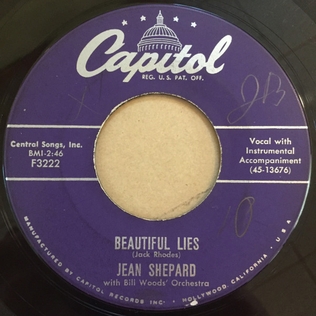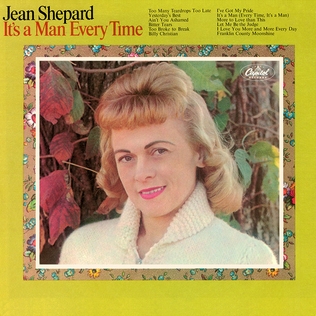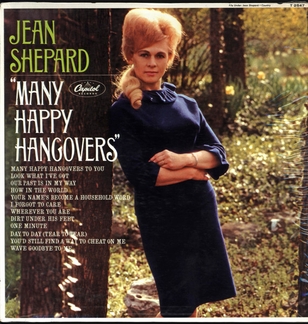Related Research Articles

Ollie Imogene "Jean" Shepard, was an American country singer who was considered by many writers and authors to be one of the genre's first significant female artists. Her early successes during the 1950s decade were said to influence the future careers of Loretta Lynn, Dolly Parton and Tammy Wynette.

"Slippin' Away" is a song written by American singer-songwriter Bill Anderson and was originally recorded by American country singer Jean Shepard. Inspired to write the song while watching an old film, Shepard chose to the song to record and it was released as her first single for the United Artists label in 1973. It became her first top ten US country song in several years and was issued on an album of the same name.

"Beautiful Lies" is a song written by Jack Rhodes and recorded by American country singer Jean Shepard. It was released in September 1955 by Capitol Records as a single. It became Shepard's fifth top ten single on the US country chart in her career and was given positive reception by critics.

"Second Fiddle (To an Old Guitar)" is a song written by Betty Amos that was originally recorded by American country singer Jean Shepard. It was released as a single by Capitol Records in 1964, reaching the top five of the US Country chart. The song featured Shepard yodeling and was her first top ten single in ten years. The song would later be nominated by the Grammy Awards.

"Many Happy Hangovers to You" is a song written by Johnny MacRae that was originally recorded by American country singer Jean Shepard. It was released as a single by Capitol Records in 1966, reaching the US country top 20 that year. It received a positive review from Billboard magazine following its release and was included on her 1966 studio album of a similar name.

"If Teardrops Were Silver" is a song written by Don Wayne that was originally recorded by American country singer Jean Shepard. It was released as a single by Capitol Records in 1966, reaching the US country top ten that year. It received positive responses from Cashbox and Record World magazines. It was included on her 1967 studio album of a Heart, We Did All That We Could.

"Heart, We Did All That We Could" is a song written by Ned Miller that was originally recorded by American country singer Jean Shepard. It was released as a single in 1967 and reached the top 20 of the US country songs chart. It received positive reviews from music publications was included on Shepard's studio album of the same name. The song has been performed routinely in the Country Bear Jamboree entertainment attraction at Walt Disney World.

"Your Forevers (Don't Last Very Long)" is a song originally recorded by American country singer Jean Shepard. It was written by Wes Buchanan, Cliffie Stone and Scott Turner. Released as a single by Capitol Records in 1967, it reached the top 20 of the US country songs chart. It received a positive review from Cash Box magazine and appeared on a studio album of Shepard's with a Your Forevers Don't Last Very Long.

"Then He Touched Me" is a song originally recorded by American country singer Jean Shepard. Written by George Richey and Norro Wilson, it reached the top ten of the US country chart and was nominated by the Grammy Awards. It was Shepard's ninth top ten single in her career and was included on her 1970 album A Woman's Hand.

It's a Man Every Time is a studio album by American country singer Jean Shepard. It was released in November 1965 by Capitol Records and featured 12 tracks. The album's title track was its only single. It was given a positive reception by Billboard magazine following its release and was her second album to make the US country chart.

Many Happy Hangovers is a studio album by American country singer Jean Shepard. It was released in July 1966 by Capitol Records and contained 12 tracks. The album's concept was centered on songs about an evening out followed by songs about the morning after. Among them was the album's title track. Released as a single, it reached the top 20 of the US country chart in 1966. The album was given a positive reception by Billboard, Cashbox and AllMusic.

I'll Take the Dog is a studio album by American country artists Jean Shepard and Ray Pillow. It was released in November 1966 by Capitol Records and was a collection of duets between the duo. The album's songs focused on marital conflicts and other themes. Its title track was a top ten single on the US country chart in 1966. The album itself reached the top 20 of the US country chart. The album was met with positive reviews from Cash Box and Record World.

Heart, We Did All That We Could is a studio album by American country singer Jean Shepard. It was released in March 1967 by Capitol Records and featured 12 tracks. The album's material centered on heartbreak and despair. Six of the tracks were originally singles released between 1963 and 1967. Both "Second Fiddle " and "If Teardrops Were Silver" reached the US country top ten, while the title track reached the top 20. The album itself reached the US country top ten in 1967. The disc received positive reviews from both Billboard and Cashbox.
"A Tear Dropped By" is a song originally recorded by American country singer Jean Shepard. Composed by Larry Lee and Rusty Adams, it was released as a single in 1964, reaching the top 40 of the US country chart that year. It was one of 30 top 40 singles Shepard had in her career. It was given positive reviews from critics following its release.

Your Forevers Don't Last Very Long is a studio album by American country singer Jean Shepard. It was released in September 1967 by Capitol Records and consisted of 12 tracks. The album was both a collection of new recordings and cover tunes. Of the new recordings was the album's only single "Your Forevers ". The title track reached the top 20 on the US country chart in 1967. The album itself also reached the US country top 20 and received a positive review from Cash Box magazine.

Heart to Heart is a studio album by American country singer Jean Shepard. It was released by Capitol Records in February 1968 and contained 12 tracks. The album's material mixed ballads with uptempo material. Many of the album's songs were cover tunes. Its lead single was "I Don't See How I Can Make It", a top 40 entry on the US country chart. The album received positive reviews from publications following its release. It was the eleventh studio album in Shepard's career.
"I Don't See How I Can Make It" is a song written by George Richey that was originally recorded by American country singer Jean Shepard. Released as a single in 1967, it reached the top 40 of the US country songs chart.

Seven Lonely Days is a studio album by American country singer Jean Shepard. It was released in September 1969 by Capitol Records and was her fourteenth studio album. The ten-track collection featured several covers, including the title track. Released as a single, the title track reached the top 20 of the US country songs chart. The album itself also reached the US country albums survey. Seven Lonely Days received reviews from both music magazines and music websites following its release.
"A Woman's Hand" is a song written by Jan Crutchfield. It was originally recorded by American country singer Barbara Fairchild and was released as a single in 1969. Her version entered the top 70 of the US country songs chart. It was notably recorded by American country singer Jean Shepard whose version was released as a separate single in 1970. Shepard's version reached the top 30 of the US country chart. Both songs appeared on individual studio albums by each recording artist.
"I Want You Free" is a song written by Martha Sharpe and first recorded by American country singer Jean Shepard. Released as a single in 1970, it reached the top 40 of the US country songs chart. It was later included on Shepard's 1970 album A Woman's Hand and received reviews from two music publications following its release.
References
- ↑ Cooper, Dan. "Jean Shepard Biography". AllMusic . Retrieved 15 June 2024.
- 1 2 Whitburn, Joel (2004). The Billboard Book Of Top 40 Country Hits: 1944-2006, Second edition. Record Research.
- 1 2 3 Shepard, Jean (October 1964). ""A Tear Dropped By"/"He Plays the Bongo (I Play the Banjo)" (7" vinyl single)". Capitol Records . 5304.
- 1 2 "COUNTRY REVIEWS" (PDF). Cash Box . March 27, 1965. p. 42. Retrieved 17 June 2024.
- ↑ Skinker, Chris (1995). "The Melody Ranch Girl (box set biography book)". Bear Family Records : 34. BCD-15905-EI.
- ↑ Shepard, Jean (January 1967). "Heart, We Did All That We Could (Liner Notes)". Capitol Records . ST-2690.
- ↑ "Jean Shepard Chart History (Hot Country Songs)". Billboard. Retrieved June 17, 2024.